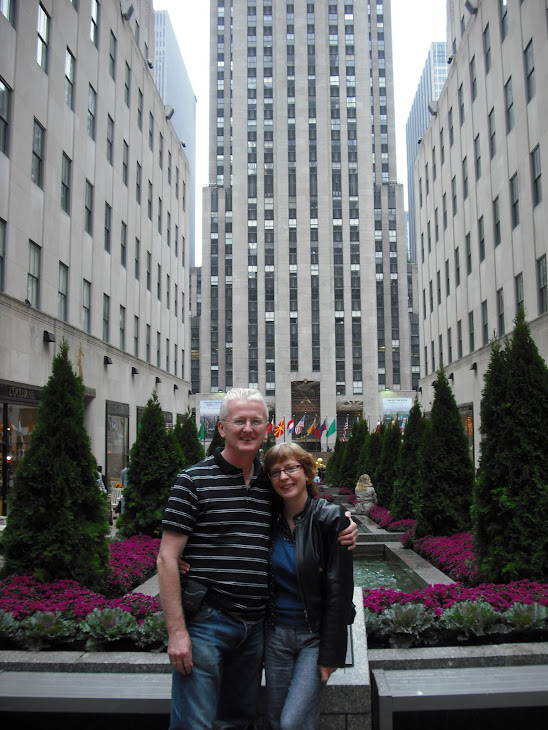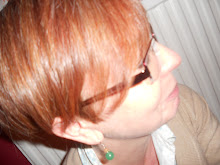Monday, 11 April 2011
A visit to King's College and I learn something new.
Roch tells me that he feels he is standing - correction - tottering - on the edge of decrepitude. It's true he is so much slower now. I often ask him how he is, how he is feeling and he doesn't give details, just says he's ok. So there are times when I look at him and I really don't know how he is - I know how he seems to be on the outside, but how he really is, I couldn't tell you. At times like that I feel a little disconnected from him. Maybe that's ok with him. He doesn't have to tell me. If people ask him how I am, he says "I don't know. You'll have to ask her." It's because I don't really delve deep enough to know how I really am. Sad, yes. Frightened of the future. Yes. Further than that - I'll have to work it out with my counsellor... Occasionally I ask him if there are any changes, and then he'll usually tell me. Hospital appointments are instructive and I learn a lot. Today we went to King's College Hospital for two appointments. The first was so that they could carry out an EMG test. Professor Al-Chalabi had asked Roch at his last appointment if he minded this test being carried out again. It's not pleasant. It is one of the tests they do when they think a person may have MND and it's unusual for someone to have the test twice. I think Professor Al-Chalabi is interested in the way Roch's illness is presenting. If Roch had refused to have the test again, he wouldn't have pressed the issue. I think Professor Al-Chalabi is tying up some loose ends. So what's an EMG? Well, it's Electromyography, to give it it's full name, which is the study of the electrical activity in your muscles when they move. The activity is recorded from a fine needle which is placed in the muscle. As we know, muscles work because messages are sent to them from the brain via the nerves. Nerve conduction studies are tests to measure your nerve reactions and to measure how fast your nerves conduct these messages. The first time Roch had an EMG was at Charing Cross Hospital about this time two years ago. Unfortunately the experience was made doubly unpleasant because the person carrying out the test didn't have much of a bedside manner. Happily, today was different. Professor Mills carried out the test. To those of you who work with me I say, he reminded me of Neal. I don't need to explain further to you! Professor Mills has a gentle, self-effacing manner and we both immediately felt at ease in his company. He carries his professional knowledge and expertise lightly but as with Professor Al-Chalabi, he is clearly expert and so his patient feels safe with him. We met with nothing but kindness from the nursing staff and from him. I found the procedure very interesting to observe and took notes for the blog. I think I worried Professor Mills a bit! He started by putting a red velcro strap around Roch's right ankle and I thought how thin Roch's ankles are now. He tested a nerve in the right foot to start with and continued up the body on both sides, measuring the speed of conduction in the nerves. He applied small electrical pads to the skin on various different parts of Roch's body in turn, foot, leg, arm etc., and the nurse placed a strange contraption on Roch's head, at a sign from Professor Mills. He gave Roch instructions; "Push your knee down into the bed. Relax your arms, drop your head back. Push the knee down gently." Meanwhile the nurse would hold the alien-looking helmet device on Roch's head. He was measuring the time it took for messages to get from brain to muscle. Right knee - 26.7 milliseconds; left knee 27.3 milliseconds. Within a millisecond on the two sides. Then he turned his attention to Roch's arms and a different contraption (slightly less weird) was held on top of his head. (At this point Roch declared "I'm ready to talk now!") Then a fine needle was placed expertly by Professor Mills into a succession of muscles in turn (he never faltered in finding the correct muscle point at which to place the needle), occasionally (ouch!) sending the needle futher in. The needle was placed in Roch's shoulder, near his neck ("Now shrug, relax your shoulders") and also on his throat ("Put your tongue against the back of your lower teeth, close your mouth, now open your mouth, put your tongue out"). I could see the Professor's screen where the results of the tests were appearing - but it meant nothing to me of course. Just a series of zig-zagging lines. Throughout the procedure he was careful to check in with Roch. Afterwards Roch said it had been 'a piece of cake' compared to the first time. He really had not been looking forward to it. The results of the test will go to Professor Al-Chalabi and no doubt he will talk us through them in July. It will probably make very little difference to us, but it may provide him with further information about how the disease is presenting in Roch. Many thanks to Professor Mills and the nurse who assisted him, for making it much less of an ordeal than expected (and no-one was scary at all!) We brought the wheelchair today. That's the first time to King's College. Last time was the first time we drove. Roch is so right. He is in the Country of Last Times. No more public transport, no more walking from the car park to the hospital building. So we made our way to see Andrew, who is the nurse Roch sees for the LiCals trial. It is month 15 and only 3 more months to go on the trial for lithium. This is where I learn a lot. Andrew takes his blood pressure, takes a blood test, sometimes carries out an ECG (but not today) and then we come to the questionnaires. Always the same questions, but over the months, the answers have become different. Walking, turning in bed, swallowing, cutting up food, going upstairs, dressing/washing. Can he do these things a. with no problem at all b. with some assistance, but mostly by himself c. not at all - I paraphrase, but you get the idea. So this is where I hear how he is really doing. The other day I watched him cutting up his food. He doesn't like me to help him, unless it's really necessary. Somewhere inside I felt an ache, a kind of pain. It hurt me to watch him as he held the knife and fork with concentrated effort. It is such a struggle for him to do so many things by himself (c. not at all or mostly b. with assistance). I really don't know where I will find the strength to watch the rest of his decline. I only know I must find it somewhere. Actually, the physical stuff I know, mostly, but the second set of questions are about how he is doing in himself. This I find interesting. He cannot say 'Ok' to Andrew. Is he cheerful a. all the time b. most of the time c. none of the time? Today I discovered that he feels like something bad is going to happen a lot of the time, that he is anxious a lot of the time, that he feels low more often than is obvious. None of this surprises me. I know that he feels he is tottering on the edge of decrepitude. But he can still find the humour in things 'most of the time' and is cheerful 'most of the time'! It was a cheerful drive to the hospital. We enjoyed the sunny day and thanks to our several detours and Mrs. Satnav's recalculations, we drove by Buckingham Palace and along Horse Guards Parade, past the Houses of Parliament and over Westminster Bridge. It was fun. When I was in Dublin, he posted a link from youtube on Facebook. It was a song for me. 'Just another day without you.' Jon Secada. It's not like him to be sentimental and I was touched. Last night, in bed he turned to me and said "We have plenty of time left together, don't we?" "Of course we do," I replied. "Of course we do." We do. Don't we?
Subscribe to:
Post Comments (Atom)


No comments:
Post a Comment